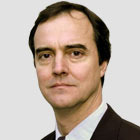Liberal finance laws and discreet brass plates have lured financial groups to London, but now they are facing increased scrutiny Mayfair has proved a desirable residence for leading financial firms but some are now under scrutiny from regulators. Photograph: Christopher Furlong/Getty Images Remember London's reputation for light-touch financial regulation? No one likes to talk about it any more, but the system was held aloft by Gordon Brown when he was chancellor as the reason why London overtook New York as the global centre for western capitalism. That was before queues formed outside branches of Northern Rock and some of Britain's largest high street banks crumbled in the face of the worst financial crisis since the Great Depression. From being a champion of that light touch approach – based more on general principles than detailed rules –, Brown has been at the forefront of international efforts to tighten financial oversight around the world. Last week, he supported proposals from the International Monetary Fund for new taxes on banks to pay for future clean-ups and discourage irresponsible risk-taking. Throughout the developed word, regulators, government and central banks are proposing measures designed to clamp down on institutions to prevent another meltdown. In the US, the Senate will vote shortly on a financial regulation reform bill that is being championed by President Obama that seeks to prevent retail banks from gambling on the financial markets. Light-touch regulation is now viewed as a curse that played a role in the onset of the credit crunch and recession. With government support, Lord Turner, chairman of the Financial Services Authority (FSA), has tightened the regulatory net in a bid to curb the ability of banks to take excessive risks by forcing them to hold more capital and increase holdings of liquid assets and cash. But for years, Brown resisted demands from leftwingers to raise the top rate of income tax or abolish tax concessions for foreign non-domiciled residents, and championed Britain's regulatory regime as being more liberal than America's. The US suffered in the wake of the dotcom crash when the country introduced a swathe of new regulations (under the Sarbanes-Oxley Act) that were designed to prevent the collapse of another Enron or WorldCom - big US companies where directors faced accusations of fraud. One upshot of Sarbanes-Oxley was that international companies preferred to float in London rather than New York to escape the costs linked to onerous US listing requirements. During the Blair years, London's new-found reputation for economic liberalism, low taxation for the rich, attracted dozens of hedge funds, private equity firms and other financial groups, which flocked to the city's plush Mayfair district to take advantage of the benign regulatory climate. The UK financial services industry grew in importance, accounting for around 8% of output and employing more than 1 million people. But wander around Mayfair on any given day and you could be forgiven for not noticing the secretive hedge funds that have offices in the area. Partly, this is because hedge funds aren't allowed to advertise and partly it's because they like to keep themselves to themselves. The most you will see is a brass nameplate or two, because an address in this part of London shows you are serious, and have the money and confidence to pay the world's most expensive commercial rents. But here you will find the offices of firms such as UK hedge fund operator Odey Asset Management, led by Crispin Odey, private equity firm Blackstone, and Paulson & Co, headed in America by John Paulson, who made millions by betting on the bursting of the US housing bubble. Here, too, is the headquarters of R20, led by property entrepreneur Robert Tchenguiz. It recently emerged that Tchenguiz was one of the largest borrowers of failed Icelandic bank Kaupthing, which backed some of his most high-profile acquisitions, including stakes in Sainsbury's, Mitchells & Butlers, Whitbread and Somerfield. In Iceland, Kaupthing is being investigated for fraud and is the subject of an inquiry by Britain's Serious Fraud Office (SFO), but there is no suggestion of wrongdoing by Tchenguiz. Critics contend that light-touch regulation has made London susceptible to the excesses of the recent past. Philip Augar, author of The Death of Gentlemanly Capitalism, says: "There is a consensus that our approach to regulation was too lax and contributed to the euphoria and eventual crisis." Alan MacDougall of shareholder activist group Pirc says: "We have welcomed the shift away from a 'light-touch' regulatory stance, which was clearly adopted and retained in no small part as a result of intensive industry lobbying. Not only was it ineffective in practice, but it was theoretically flawed too. The light-touch approach was almost inevitably going to cause problems." Hugh Fraser of the Corporation of London says that before the crash, "regulation was not strict enough and the risk models adopted by the banks were a total failure". It is hard to prove a link between light-touch regulation and the financial exuberance of recent years. But the London-based operations of a number of institutions have come under the spotlight since the banking crisis erupted in 2007. The latest is US bank Goldman Sachs: one of its London-based bond traders, Fabrice Tourre, is at the heart of a fraud case brought by the US Securities and Exchange Commission. Last week, Tourre was barred from working in the City of London after being accused of mis-selling a complex parcel of toxic mortgages to the bank's own clients while another client, Paulson, was shorting them. Although the request to remove Tourre emanated from Goldman itself, it is understood that the City regulator placed pressure on the investment bank to effectively ban him from working in the Square Mile. The US regulator has charged both Tourre, who remains on extended leave but has been cleared of any wrongdoing by the bank, and Goldman with actively misleading its own clients over the sale of toxic derivatives tied to the downfall of the US housing market. Last year, the Mayfair offices of AIG, the American insurance group which had to be rescued by the American government, were probed by the SFO. The British business, AIG Financial Products, was led by Joseph Cassano, who spearheaded the group's ill-fated move into complex debt derivatives, the financial instruments that brought AIG to its knees and led to an unprecedented US government bail out of the firm worth $85bn. Most of the derivatives business emanated from London. Internal documents from November 2007 reveal that PricewaterhouseCoopers, the auditors, wrote memos to AIG's chief executive, Martin Sullivan, challenging the London unit's financial controls and questioning how they valued credit default swap contracts protecting $62bn in mortgage-backed securities. The SFO launched a criminal investigation into Madoff Securities International Limited (MSIL) – whose office was in Mayfair – with a view to establishing whether people in the UK were part of the $65bn Ponzi scheme created by Bernard Madoff. He was convicted of fraud and sentenced to a 150-year jail term. The SFO inquiries centred on suspicions that Madoff's London unit was used to launder billions of pounds, with cash sent back to the US to give the impression the company was generating large profits. The SFO called off its investigations earlier this year after deciding there was insufficient evidence anyone at MSIL had committed any crimes. But it continues to investigate the so-called "feeder funds" active in Britain, which channelled money to the US parent company. But the most high-profile London link to the collapse of the financial system relates to Lehman Brothers' London operations, which allegedly played key roles in the investment bank's attempts to hide $50bn of bad assets on its balance sheet in the run up to its eventual implosion in September 2008. A report by a US court-appointed investigator Anton Valukas found that the bank had to use its European arm, based in London, to undertake questionable accounting practices as they were not considered legal in the US. Hugh Fraser warns that no system of regulation can "eliminate risk altogether … and in a competitive environment such as financial services, people will push the boat out … although where there is illegality, offenders should be locked up". He says that the best we can hope for is a regulatory regime where the "downside risks are limited and regulators are equipped to deal with the fast pace of innovation in the financial sector". Professor Geoffrey Wood at Cass Business School argues that it is essential banks be allowed to fail. He says: "Banks took risks because they knew they would be bailed out. Lehman was the exception, but there was nothing wrong in letting it fail. The problem was that we didn't have a system in place that would have allowed an orderly wind-up of its affairs." Fraser adds: "Let's not forget that the credit crunch started in the most regulated market in the world, the US. Accepted, the system sprang a few leaks, to say the least; but the key is to plug the holes and move on." If only it was that simple. Mayfair has become an attractive location away from the City of London for private banks, hedge funds and wealth managers. But the district's expansive and handsome architecture has always attracted the very wealthy. For nearly 300 years the most influential people in the land have enjoyed its elegant squares, broad Georgian thoroughfares and parks. Mayfair also boasts the capital's most exclusive shops, hotels and restaurants, and includes Savile Row, world famous for its tailoring, as well as New and Old Bond Street, renowned for jewellery and auction houses. Mayfair is named after the infamous 15-day fair that took place on the site that is Shepherd Market today, and which was banned in 1708 due to the fair's revellers' relentless boisterousness and disorder.Light-touch regulation spears an advance to Mayfair

MONEY AND MAYHEM
Sunday, 25 April 2010
Posted by
Britannia Radio
at
11:52
![]()






















